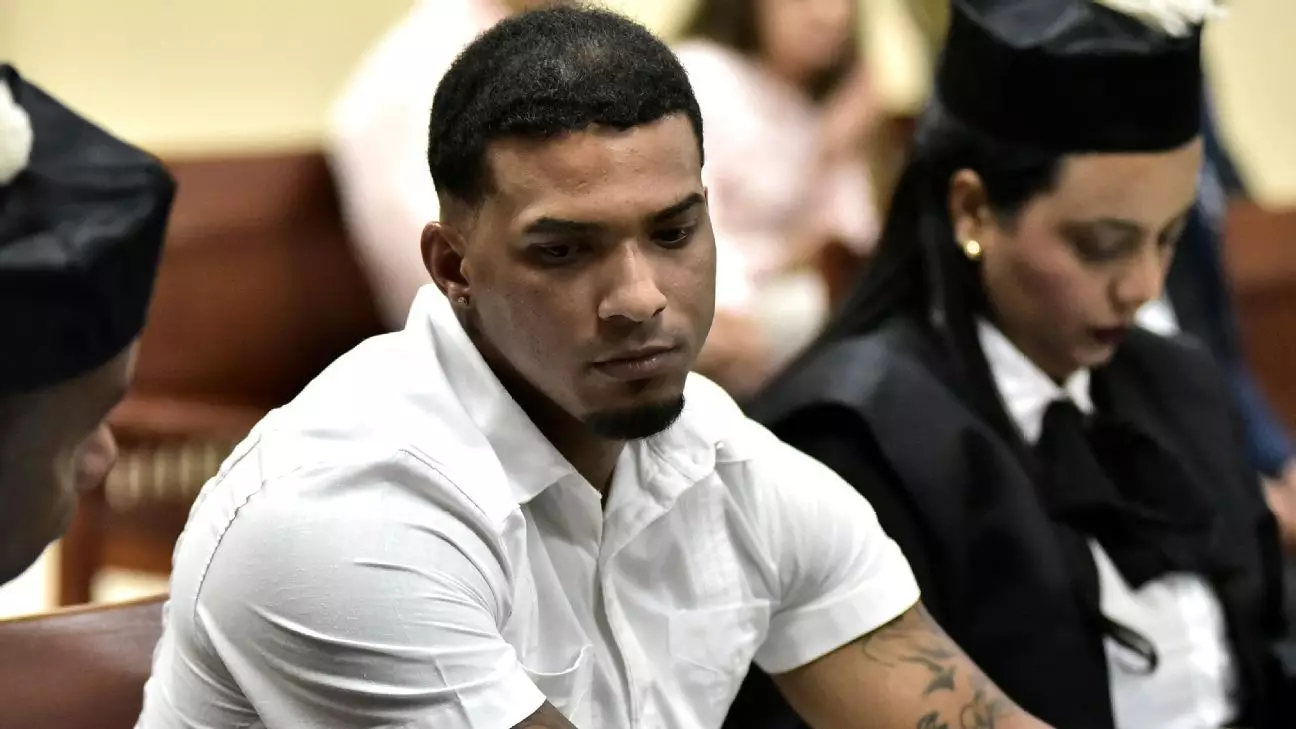The story of Wander Franco, the former shining star of the Tampa Bay Rays, has turned from one of athletic promise to a grim cautionary tale that reverberates across the sports landscape. Recently, the 21-year-old shortstop was found guilty in the Dominican Republic for sexually abusing a minor, receiving a suspended two-year prison sentence. While this decision by Judge Jakayra Veras spared him immediate incarceration, the verdict paints a troubling picture not only of Franco’s actions but also raises broader questions about accountability in professional sports.
In an era where athletes are often idolized, it’s critical to acknowledge the failure of protective mechanisms that should safeguard vulnerable individuals. Franco’s relationship with a 14-year-old girl, wrapped in manipulation and deceit, has thrust this issue front and center. The case reminds us that fame and talent do not shield one from moral accountability. There’s a disturbing truth that needs to be recognized: celebrity status can overshadow the gravity of illegal actions if left unchecked, leading to societal desensitization towards deeply troubling behaviors.
A Grievous Web of Exploitation
The case is further complicated by the involvement of the victim’s mother, Martha Vanessa Chevalier Almonte, who was sentenced to ten years in prison for sexually trafficking her daughter. This dual conviction underscores a systematic failure to protect children and indicates a troubling dynamic where financial gain overshadows parental responsibility. The mother’s motives, driven by profit rather than protection, expose the darker side of human nature—the willingness to exploit those closest to us for monetary gain.
In many ways, this situation can be likened to the age-old cautionary tales that echo family betrayal and moral decay. The amalgamation of Franco’s high-profile status and the horrendous actions of those around him creates a perfect storm for public outrage. Fans, once giddy with excitement over his baseball prowess, now find themselves grappling with the stark dissonance between their adoration and his actions. It raises a poignant question: How do we reconcile our admiration for athletes with the troubling truths that may lurk beneath the surface?
The Fragile Nature of Professional Careers
Franco’s ascent in Major League Baseball was meteoric; he was hailed as one of the sport’s top prospects and signed to a contract worth $182 million—one of the most lucrative deals in franchise history. However, the emerging scandal has forced him onto the restricted list, which not only prevents him from playing but also complicates his career trajectory due to the possibility of a revoked work visa in the United States. This presents a complex layer of consequence for Franco, who epitomized hope for the Rays just a short time ago.
Moreover, his situation exemplifies the often-volatile nature of professional sports careers, where one misstep can lead to disastrous consequences. The potential fallout from Major League Baseball’s ongoing investigation could further tarnish his reputation and future opportunities in the sport. The league must grapple with how to handle such cases in the face of public scrutiny and the fundamental integrity of the game. Will they send a strong message, or are we to expect a response laden with corporate ambiguity?
Systemic Issues in Professional Sports
Franco’s case lays bare systemic issues within professional sports, where financial interests can often overshadow ethical considerations. The MLB’s current policy on domestic violence and sexual assault was designed to ensure player accountability, yet the efficacy of these rules remains questionable in practice. How swift and decisive will the league be in responding to his conviction? This is not just about one player; it’s about setting a precedent. A strong stance against such behavior could signal a shift in cultural attitudes around accountability in sports.
The realm of sports needs to cultivate an environment where respect for individuals, both on and off the field, becomes a non-negotiable standard rather than a lofty ideal. If the MLB is truly committed to its joint policies on domestic violence, sexual assault, and child abuse, they will be compelled to act decisively and transparently, emphasizing their intolerance for such abusive behavior. The public and fans alike deserve to witness that professional sports can and must do better in upholding ethical standards.
Through this complex and troubling saga, we must reflect on the broader societal implications. The Wander Franco episode is a stark reminder that achieving greatness in any field should never come at the expense of humanity and ethical integrity. As we confront the reverberations of this case, it is crucial to instigate conversations around protections for minors, accountability for predators, and the responsibilities that come with fame and success.

